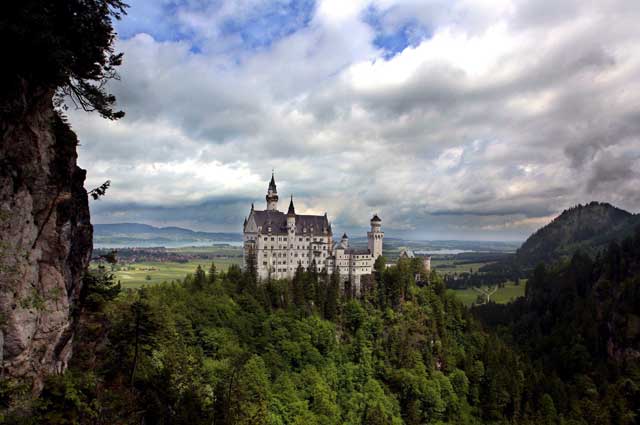Germania, By Simon Winder

A bonus of the last years of Gutenberg publishing is that occasionally book people get to write what they want to write, in a business otherwise devoted to the laboratory birth of bestsellers. In this way some elements of publishing tradition continue - such as the informed knowledge of Germany that marked many Britons before night fell in 1933. Carlyle, Thackeray, Meredith and Stevenson were fascinated by the cultural politics of tiny states and bijou dynasties. Simon Winder, publisher at Penguin Press, has added to this a history engaging and infuriating enough to hold us through over 450 pages.
The modus operandi of Germania, his "personal history of Germans, ancient and modern", recalled to my mind a book by a long-dead novelist, Bryan Morgan, The End of the Line (1957). Morgan got round "deep Europe" by minor railways plying between high-and-dry towns, now marked only by weed-grown tracks in Languedoc or Tuscany. But many German lines still "stop at every midden" and along these Winder detects what the father of the Schlegel girls in EM Forster's Howards End mourned: "Your poets are dying, your musicians to whom Europe has listened for two hundred years. Gone. Gone with the little courts that nurtured them – gone with Esterhaz and Weimar".
Winder nails this from Bahnhof to Schloss: the overgrown "English gardens", the peculiar regional delicacies (the Scots won over Helmut Kohl with haggis), eccentric museums, plaster flaking from baroque cornices on to stuffed wombats. Quite different from the imposition of Habsburg identity throughout the huge, racially crazy-paved lands of the Austrian Empire.
Many of the German microstates were – until the end of the Holy Roman Empire in 1806 – no larger than the demesnes of grand English Whigs, and generally much poorer. Two hours' walk from my Tübingen flat would take me through four. Something then emerges after 1871 which Winder (and I) find disturbing. Failing to make much sense of the phantasmagoria of medieval politics, unimproved after the Reformation because of additional religious divisions and the Thirty Years War, German unity brought the comic-sinister makeover of the Spätgründerzeit (Germans simplify this to "Victorian") and its brutalist confections: Bismarckturms, Volkerschlachtdenkmals and so on.
German history, aimed at schoolchildren and conscripts, was as reliable as the "history of the regiment" dinned into British squaddies. Worryingly, this co-existed with fissile imperial components – banks, strategic railways, the neurosis-rich Hohenzollerns. Much toxic stuff came from Britain: not just the racial theorist Houston Stewart Chamberlain and Winifred Wagner. The revulsion against "hotel cities", in the gentle Ruskinian architectural criticism of Herman Muthesius, mutated into the Lutyens-style mansions of Paul Schultze-Naumburg, royal architect, to whom flat roofs were cosmopolitan-Jewish treachery.
Was it sensible for Winder to conclude his perambulations, pictures and conversations, with 1933? His Weimar Republic is too sketchy: Bauhaus and Marlene Dietrich, but no Stresemann the Good, nor mention of Black Bavarian politics, where Hitler counted as little (or as much) as mad Francoist rebel Colonel Tejero in 1981 Madrid.
The Armageddon chic of the Nazis was a foul mixture of neo-medievalism and hyper-technology. It would be countered by the aristocratic prejudice of Lord Cherwell (originally Professor Frederick Lindemann of Baden) and the "strategy" of Sir Arthur Harris, which killed 50,000 bomber crew and a half-million civilians.
The reconstruction of the democratic republic after 1945 enforced decentralisation. Drafted in the grounds of Herrenchiemsee, the copycat Versailles which was Mad King Ludwig of Bavaria's ultimate folly, the "Fundamental Law" of 1949 was initially unpopular. But it became regarded by 1980 as the necessary pendant to the state under law, the Rechtsstaat, the greenhouse in which environmentalism, feminism and a pluralism livelier than that of the UK were incubated.
Winder has hired an irritating troupe of adjectives. "Battered", "haggard", "hideous", etc. keep coming on stage like the Seven Dwarves. But around Chapter Ten, the adjectives exit.
Contrasting zany small-state Kleinstaaterie with the architectural-political horrors of 1933-45, he gets through, very movingly, to a merciless truth. The redemption offered in the words of anti-Nazi activist Sophie Scholl before her beheading in 1944 - "Such a fine, sunny day, and I have to go, but what does my death matter, if through us thousands of people are awakened and stirred to action?" - can only be partial. The loss of ethical authority remains and kills – whether in the ideological mayhem of Baader-Meinhof terrorism or the quandary of what Ralf Dahrendorf called Bildungsburgertum, Michael Frayn's liberal-academic "herbivores". The downside of teaching my remarkable students in Tübingen is the bottomless depression that sometimes afflicts those who find they could learn but no longer – after 1933-45 – preach.
Feuilleton and cabaret are French words made over by Germans into discursive essay and ribald satire. Winder refreshes both styles and might help rescue the Humboldtian freedoms to teach and to learn from the sclerosis of academic administration, just as in Germany the Mittelstand of small towns has seen off the gigantic supermarkets which have wrecked urban Britain.
So, well done, Winder! But your Germany, now under Bundesmutti Angela Merkel, is staggeringly woman-free. No Rosa Luxemburg, no Princess Vicky (daughter of Queen Victoria, mother of Kaiser Wilhelm), not even Lola Montez who amused Ludwig I and (fictionally) gave Harry Flashman a good gallop. MacDonald Fraser's rotter gets in, but where's A Legacy – on unintellectual Berlin Jews and Catholic aristos in the 1900s, the latter speaking French by choice, and intriguing in the Reichstag? Across the Rhine, the French spoke German, hated Berlin, and waited. It's one of the greatest political novels, and Sybille Bedford wrote it.
Christopher Harvie teaches at Tübingen University; his new book is 'Broonland' (Verso)
Subscribe to Independent Premium to bookmark this article
Want to bookmark your favourite articles and stories to read or reference later? Start your Independent Premium subscription today.

Join our commenting forum
Join thought-provoking conversations, follow other Independent readers and see their replies